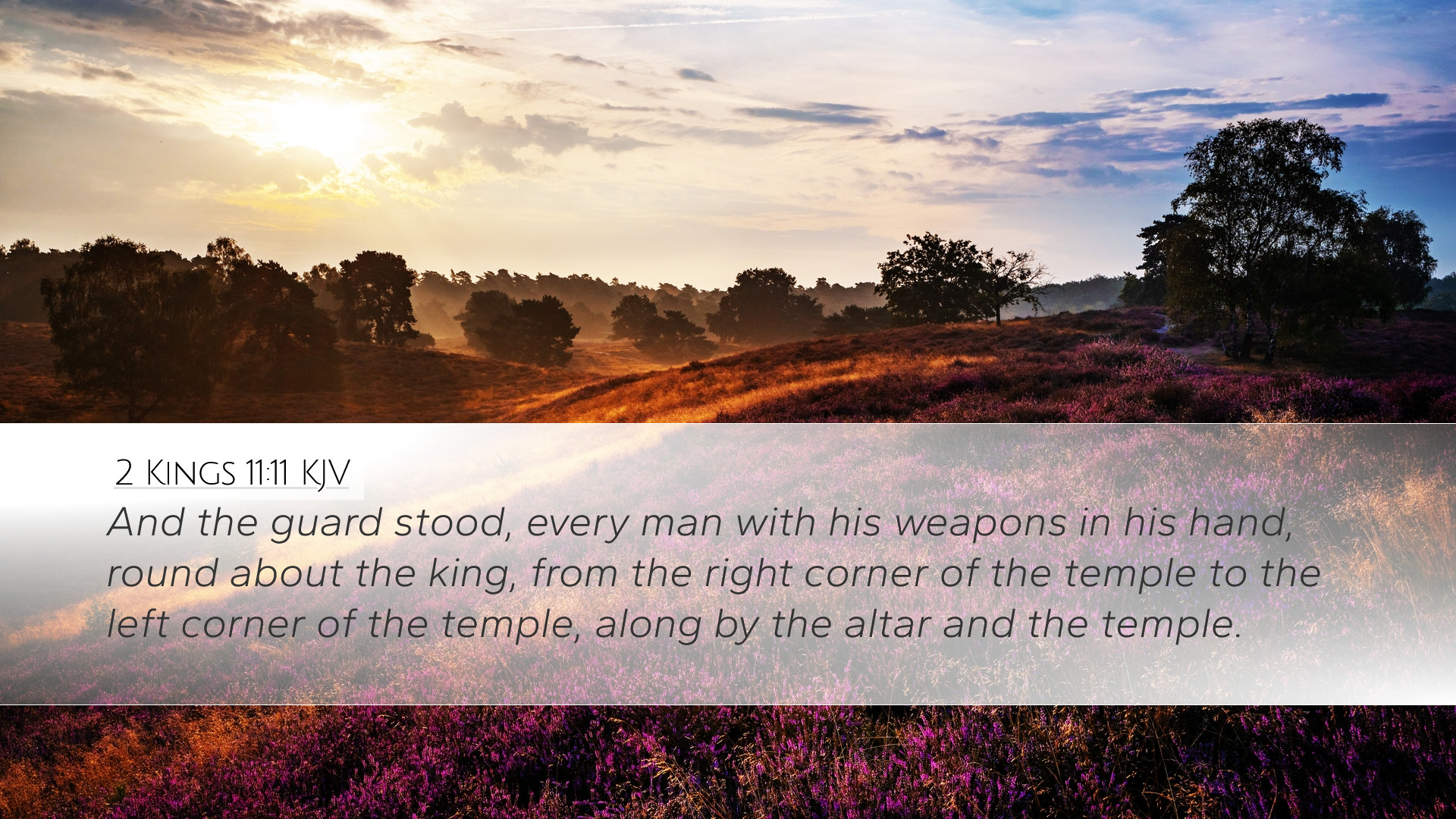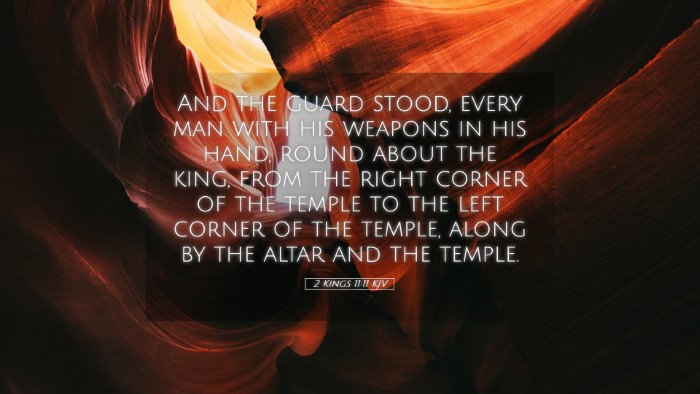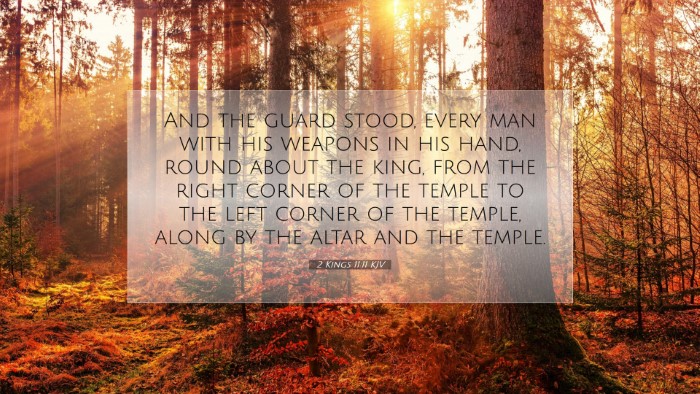Old Testament
Genesis Exodus Leviticus Numbers Deuteronomy Joshua Judges Ruth 1 Samuel 2 Samuel 1 Kings 2 Kings 1 Chronicles 2 Chronicles Ezra Nehemiah Esther Job Psalms Proverbs Ecclesiastes Song of Solomon Isaiah Jeremiah Lamentations Ezekiel Daniel Hosea Joel Amos Obadiah Jonah Micah Nahum Habakkuk Zephaniah Haggai Zechariah Malachi2 Kings 11:11
2 Kings 11:11 KJV
And the guard stood, every man with his weapons in his hand, round about the king, from the right corner of the temple to the left corner of the temple, along by the altar and the temple.
2 Kings 11:11 Bible Commentary
Commentary on 2 Kings 11:11
Verse Context: 2 Kings 11:11 states: “And the guard stood, every man with his weapons in his hand, round about the king, from the right corner of the temple to the left corner of the temple, and they brought out the king’s son, and put the crown upon him, and gave him the testimony; and they made him king, and anointed him; and they clapped their hands, and said, God save the king.”
Introduction
This verse describes a pivotal moment in the history of Judah during a time of political intrigue and instability. It highlights the role of the bodyguards in the anointing of Joash as king, marking a significant transition in leadership from the usurper Athaliah, who had sought to eliminate potential rivals to her rule.
Historical Background
The events surrounding 2 Kings 11 occur after Athaliah, the mother of Ahaziah, usurped the throne of Judah. Her reign was characterized by idolatry and violence, as she sought to eradicate the royal line of David. In this context, Joash was preserved by Jehoiada the priest, who hid him and eventually orchestrated a coup to restore the Davidic line to the throne.
1. Preservation of Joash
Matthew Henry notes that the providence of God was evident in the preservation of Joash, illustrating that despite the dark days of Athaliah’s reign, God had chosen to maintain His covenant with David. The faithful actions of Jehoiada were pivotal in ensuring that the Davidic line continued, fulfilling God’s promises throughout the generations.
2. Role of the Guard
The verse emphasizes the guard’s critical role in protecting the anointing ceremony, illustrating a fierce loyalty to the preservation of the Davidic lineage. Albert Barnes remarks that the guard not only provided physical protection but symbolizes the divine guardianship over the royal line, highlighting the theme of God safeguarding His chosen leaders.
Anointing and Acclamation
The anointing of Joash is steeped in theological significance. According to Adam Clarke, the act of anointing itself is a sign of divine selection and empowerment. Joash is not merely being crowned; he is being sanctioned by God for leadership. The people’s applause, “God save the king,” reflects their recognition of divine appointment, reinforcing the importance of divine sovereignty in the establishment of kingship.
3. The Testimony and the Crown
The “testimony” mentioned in this verse often refers to the covenantal obligations laid out in the Law. This element is vital as it signifies that Joash’s kingship is not just a political reality but also a spiritual one, tied to the identity and covenant of Israel. Matthew Henry emphasizes that Joash was not only to reign but to uphold the laws and commands of God, ensuring that his rule would bring the nation back to rightful worship.
4. Public Acceptance
The act of clapping hands denotes acceptance and joy among the people. Albert Barnes points out that this communal celebration signifies the restoration of hope and national identity for Judah after a tyrannical reign. It is a profound moment, as the people express their desire for deliverance from oppression and their eagerness to follow a divinely appointed leader.
Theological Reflections
In studying 2 Kings 11:11, several theological themes emerge.
- Divine Sovereignty: The text underscores that God governs the affairs of nations and using human instruments can position leaders according to His plan.
- The Importance of Faithfulness: Jehoiada's crucial role reminds us of the importance of faithfulness and courageous action in times of moral and spiritual crisis.
- Restoration of True Worship: Joash’s anointing points to God’s commitment to restoring proper worship in Judah, emphasizing that good leadership is aligned with godly principles.
Conclusion
2 Kings 11:11 serves as a poignant reminder of God’s unyielding commitment to His people, even amidst oppression and corruption. The anointing of Joash as king signifies a new beginning and reinforces the belief that God is actively working through history to fulfill His divine promises. Pastors, students, and theologians are encouraged to reflect upon the implications of divine sovereignty, human agency, and the responsibilities that come with leadership as they explore this profound biblical narrative.


